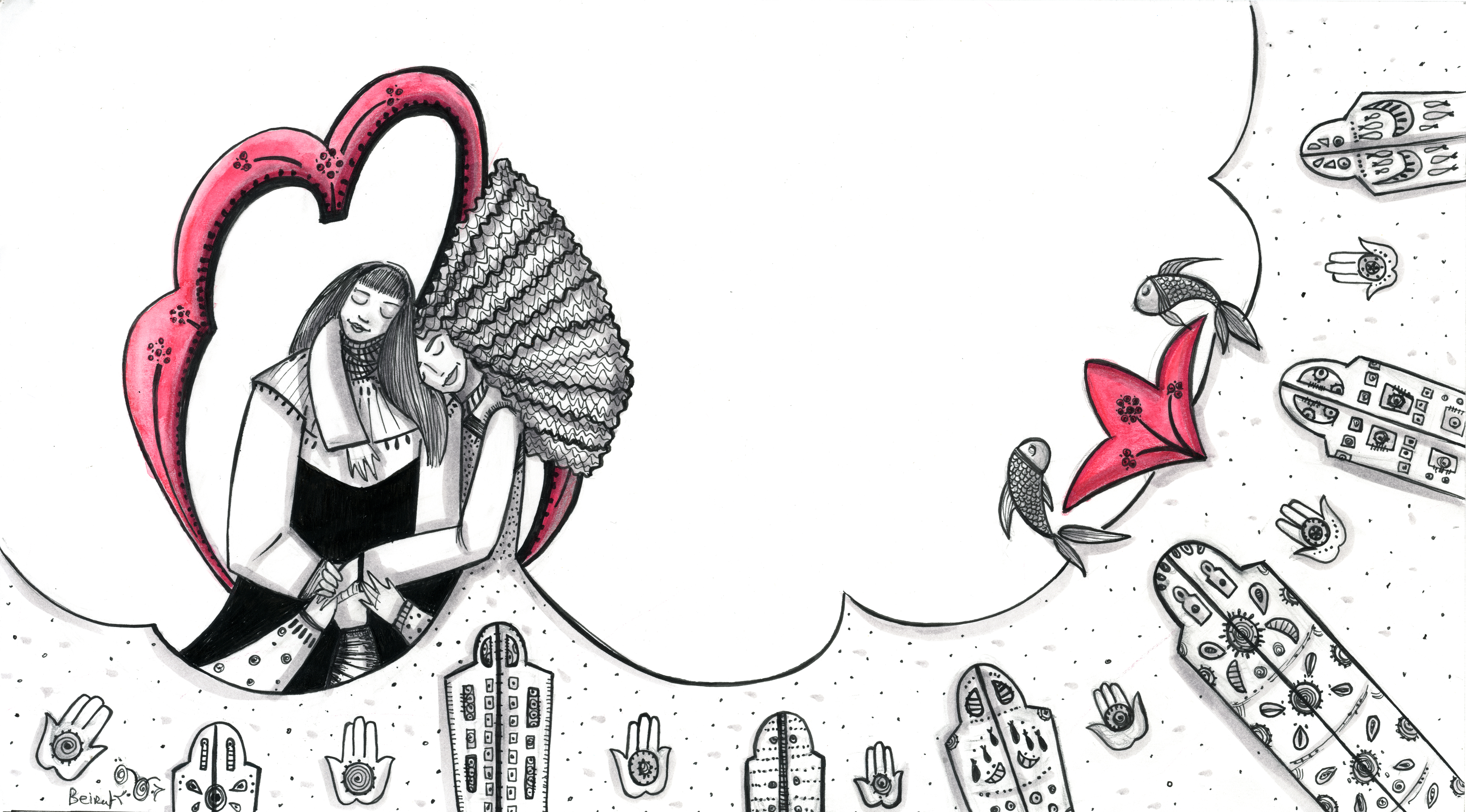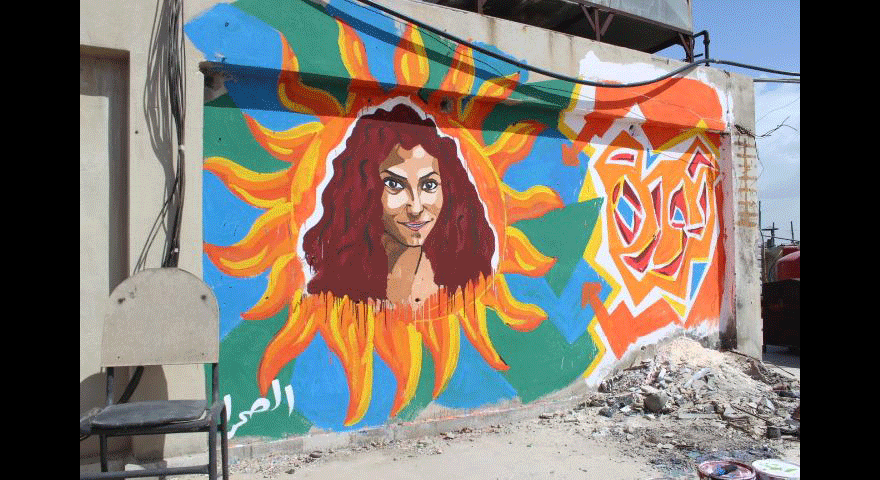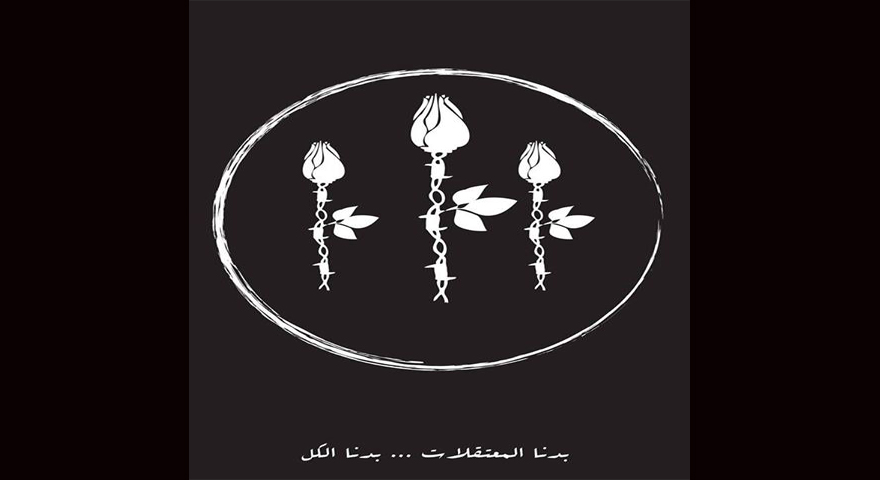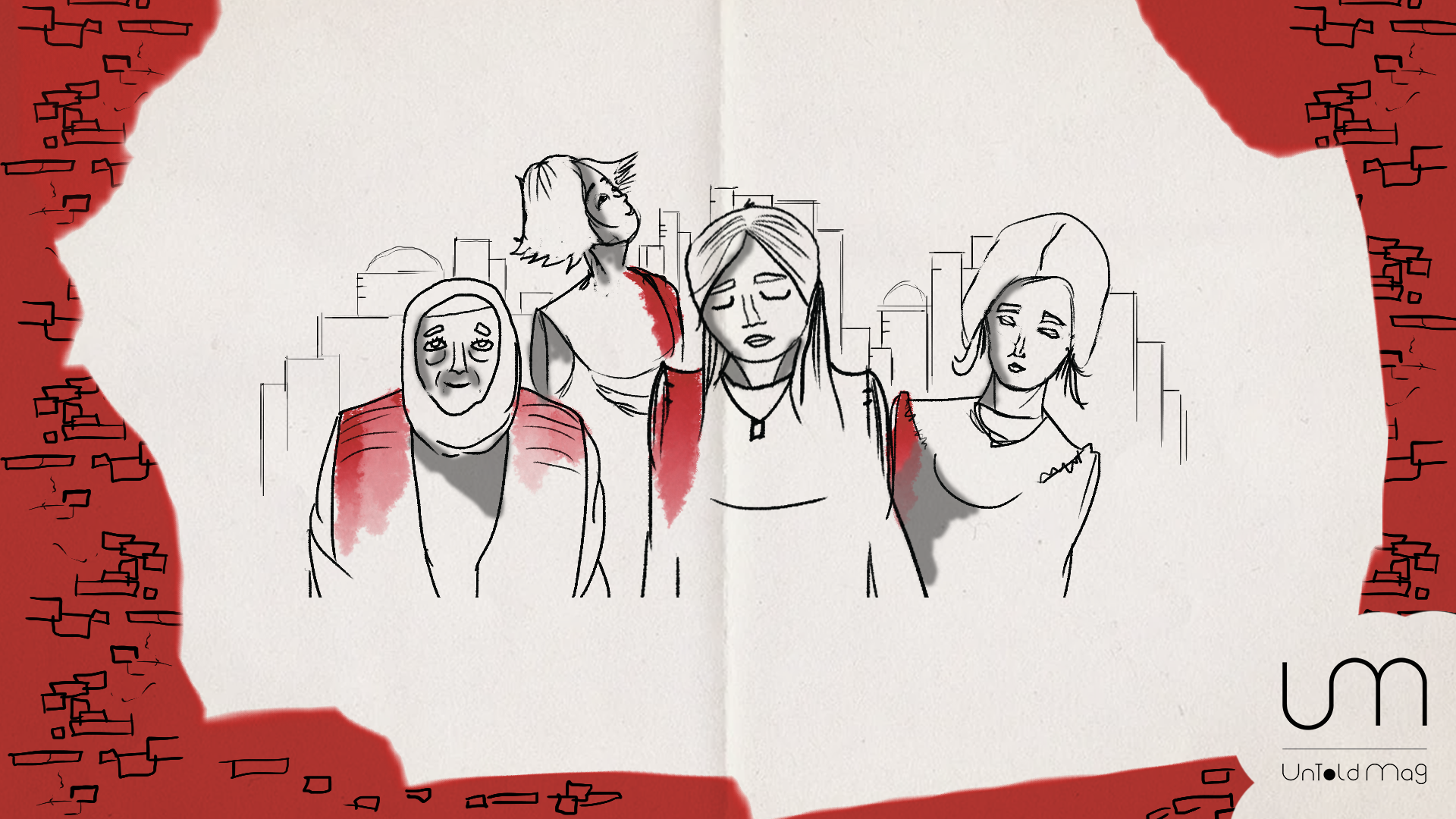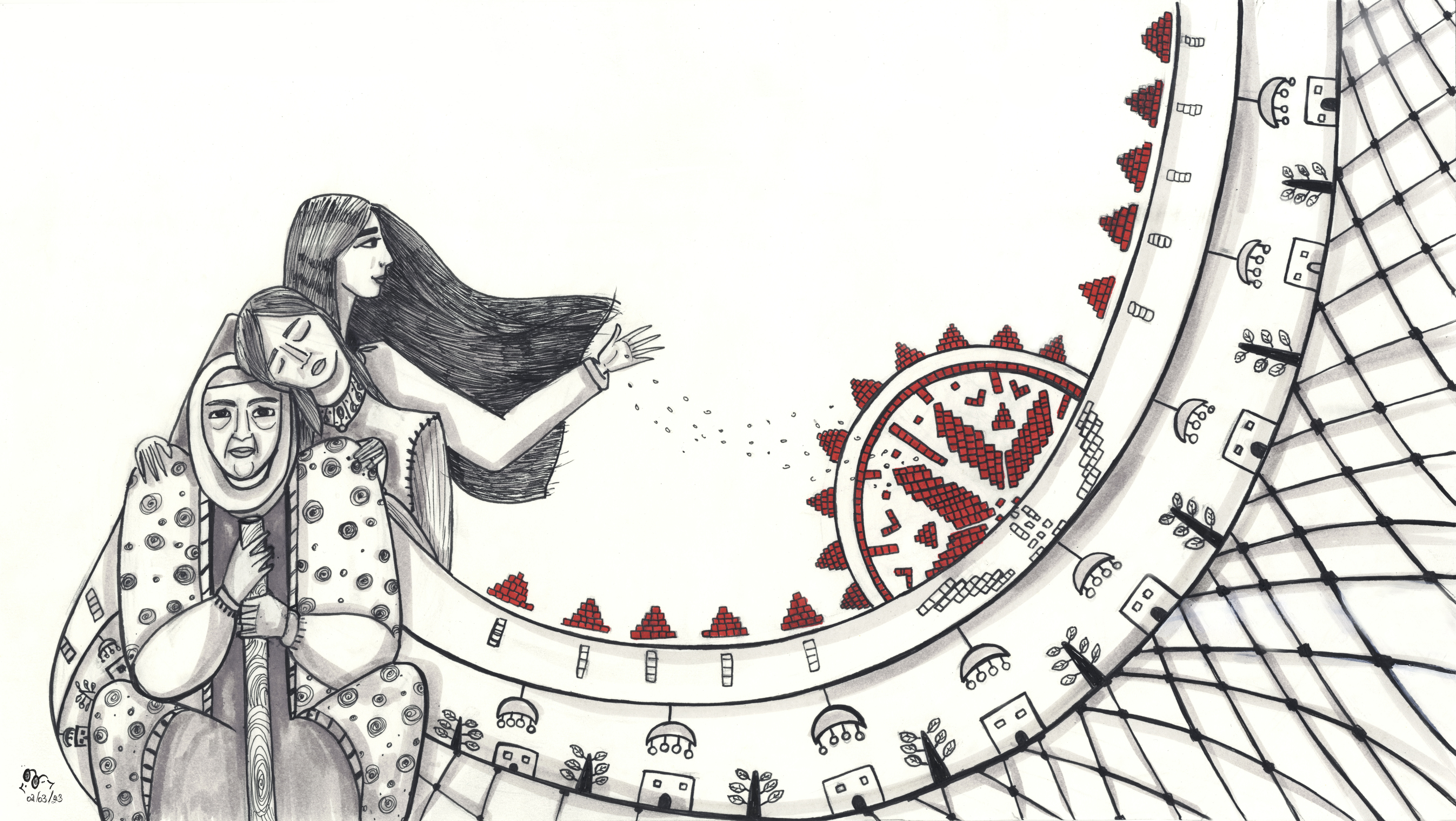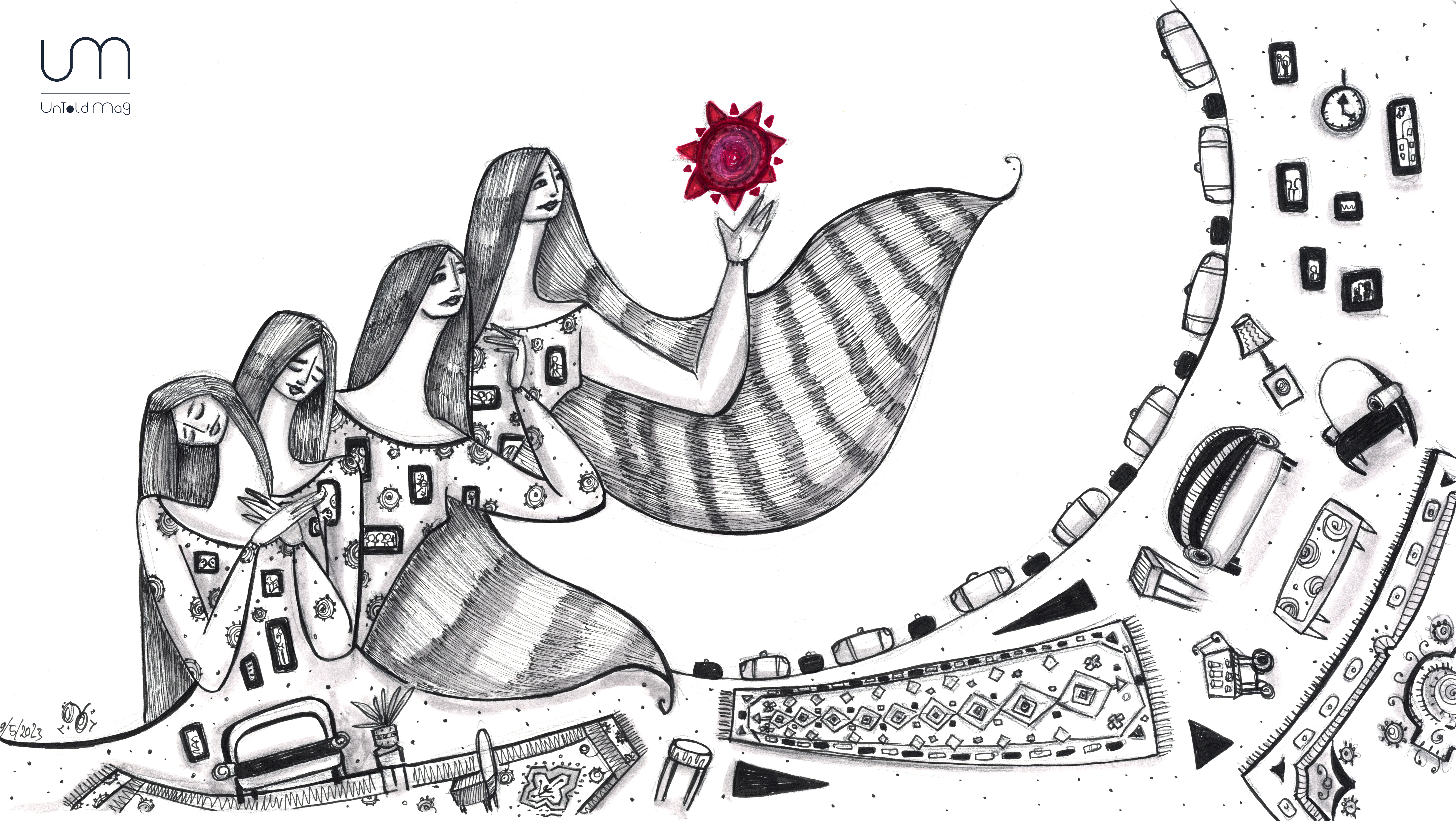The first attempts to work together between older and younger generations of feminists in Algeria took place in 2019. I was deeply involved, and did not realized that in this period of organization, I was uncovering a feminist movement whose significance and sensitive history had never been documented. I had always believed that struggles and movements were built upon continuity, but after two years of joint action, I discovered that the wars and violence our region has experienced have caused discontinuity and differences as well. Until today, I continue to ask myself if I am a product of continuity and whether there is a connection between our intersectional feminist struggles and practices, and the collective Algerian history of the struggles for gender equality.
Later, I came to realize that we were imposing taboos on discussing our internal differences, and thus avoiding to address them. This must not continue, as it only worsens the situation within our feminist movements.
A comrade from the older generations of the feminist movement narrates the battle for equality during the independence era
In 1962, during Algeria's struggle for independence, Algerian women faced numerous challenges in exercising their rights and citizenship. These challenges included remnants of colonialism, ignorance, poverty, and a patriarchal system that seized power and demanded women who had participated in the war of independence to return to the kitchen, viewing it as the natural and inevitable place for women.
The fight for the education and empowerment of women succeeded in the first few decades of independence. However, state policies that neglected the pursuit of civil and political rights and equality allowed the male-dominated society to restrict women under a glass ceiling. Feminist movements continue to combat this inequality to the present day.
The enactment of the Family Law marked the organization of the first independent women's associations
On June 9, 1984, Algeria issued its first family law. The law abolished the principle of equality between men and women and implemented the principles of Islamic law and customs, subjecting women to a law that the initial coalitions of Algerian feminists had fought against prior to its issuance. Female university students, with the assistance of female veterans of the liberation war, had already organized large marches, mobilizing thousands of women to express their complete rejection, when the law was first proposed, in 1979.
Feminism saved my life، And it could save others
04 May 2023
Following the enactment of the Family Law, the first women's associations were established. Their struggles were primarily focused on its abolition, despite differences in positions between those advocating for complete abolition and those seeking amendments. The condemnations varied due to various reasons, including ideological and party affiliations. Most feminists fought within leftist political parties, in addition to their women's associations.
The practices of political parties did not differ significantly from those of the authorities regarding women's rights. Most parties considered women's rights to be a lower priority, emphasizing the struggle for party pluralism instead, especially that many operated secretly. When party pluralism was recognized in 1989, feminists once again were told that women's rights could not be a priority in party programs, citing the specificities of society and the political and economic crises the country was undergoing.
Civil War aftermath
I believe it is the period of unhealed wounds that we continue to avoid discussing, as if its consequences did not affect us all. Even when we bring up the topic, our older comrades consider us indifferent, even though most of our generation born in the 1980s were studying in primary or middle school at the time.
Starting in 1990, the country went through a brutal civil war that took the lives of over 200,000 people. Women, in particular, became targets of so-called Islamic terrorism, resulting in the deaths of thousands of them, like Nabila Djahnine, a leftist and feminist activist, who was not only a victim of state repression, but also fell victim to armed groups and was assassinated in 1995. During the civil war, thousands of women were killed for refusing to give up their work or education, for resisting wearing the Islamic veil, and for engaging in activism. Women were kidnapped, raped, threatened, and killed, which led to a stagnation in the work of many associations by the early 2000s. Everything changed because of the war and the violence it wrought: society, the priorities of women activists, and the stances of women who are today far removed from the struggle against the Family Law.
Everything changed because of the war and the violence it wrought: society, the priorities of women activists, and the stances of women who are today far removed from the struggle against the Family Law.
Yet in 2004, a major and at least partially successful campaign was organized with the participation of Algerian associations and activists from the first generations inside and outside the country. The campaign's slogan was "Twenty Years is Enough" [‘Ishrin Sana Barakat], referring to the twentieth anniversary of the issuance of the Family Law. This campaign influenced the amendments made to the law in 2005, including the abolition of marital obedience for wives. Additionally, the National Committee of Working Women worked on criminalizing sexual harassment, while the Centre for Information and Documentation on the rights of Children and women (CIDDEF) focused on participatory democracy, and women's quotas in politics. Other associations worked on integrating and supporting single mothers and victims of violence. However, these initiatives lacked the presence of young feminists and demands related to sexual and gender minorities.
Where is the continuity? Who am I amidst all this chaos? Why wasn't my feminism concerned with family law?
I discovered my feminist anger alongside a new generation of feminists who have different ideological orientations and priorities. Although there were exceptions in western Algeria, where several young feminists joined local associations, my personal experience and the experiences of many other groups indicate that the feminism of young women will evolve and organize independently of the older generations. This may occur through clandestine organized groups or online initiatives, driven by factors such as media blackout on feminist work, the absence of archives and spaces for exchange and networking, or simply due to differing priorities.
I discovered my feminist anger alongside a new generation of feminists who have different ideological orientations and priorities.
My feminist anger spawns from my reality and my thirst for freedom. Even if the institutional restriction on the general population ends, Algerian families continue to impose restriction on women. Just because I am explaining the restriction today, it doesn't mean that I was previously aware that it is not normal to be prevented from going out to public spaces without a valid reason related to study or work. My first battles were fought when I awoke from the slumber of patriarchy, breaking free from the constraints of family and its rules. Today I realize that those who complained about discrimination after independence have reproduced the same practices in the post-terrorism years. The change in security and stability, without equal benefits for men and women, has created confrontations for women, especially young women, when accessing public spaces, particularly in the realms of work and higher education, leading to other forms of violence. My generation and I were born during or after the issuance of the Family Law, which had a profound impact on our demands.
We are the generation influenced by the #MeToo campaign. Since 2006, many young initiatives focused on specific issues such as gender and sexual rights, violence, and femicide. During that period, the issue of continuity and indoctrination was not addressed, as early feminist movements lacked concern for their history. Initiatives proliferated, particularly in the virtual world. Personally, my journey began by publishing anonymously on an online platform of the medical college where I was studying. This experience sparked my interest in feminism due to the reactions I received whenever I discussed the privileges of male students in comparison to female students. I also think that we initially chose the digital realm because of the challenges associated with accessing public spaces. Additionally, the online sphere provided a means to connect with individuals who are difficult to encounter in real life.
Around 2006, the first Algerian online club for the LGBTIQ community was established, known as "GLA." Initially, it served as a platform for exchange and expression, leading to the first gatherings of the LGBTIQ community and the initiation of activist work. Notably, the community established the National Day of the LGBTIQ on October 10th each year, referred to as "Tenten." Subsequently, the group "Abu Nawas" was formed to advocate for the rights of sexual and gender minorities. However, due to various disagreements, several other groups emerged, including the prominent "Colors Association" for the LGBTIQ community. Most activities, even to this day, take place online through websites. Despite adopting the principles and methodology of intersectional feminism, there is minimal collaboration with traditional feminist associations. This highlights the lack of continuity, as some projects on gender equality prioritize funders' goals over the cause itself.
My feminist anger spawns from my reality and my thirst for freedom.
In addition to queer feminist initiatives, the rise of social media platforms led to the establishment of numerous young feminist pages. Some operate independently, while others are part of larger networks like the Unveiled Women Network. Although electronic activism within feminist movements initially went unrecognized, this form of activism imposed explicit and modern concepts of feminism. In the past, our companions spoke cautiously about feminist associations for women’s rights due to societal fear. But today we openly discuss feminism in all its dimensions.
Imane Chibane, a young feminist who organized an online protest to condemn the feminicide of Raziqa Cherif
In 2015, I was still residing in my family home in Constantine, and my activism was limited to social media posts and articles. I clandestinely met with the feminist group in my city, known as "Voix des Femmes" (Women's Voices). During the autumn of that year, various electronic feminist initiatives expressed their outrage following the murder of Raziqa Cherif by a harasser. A feminist activist, Imane Chibane, organized a protest in the capital through her online initiative. Numerous feminists responded to her call, and the media focused on the demands of activists and women, particularly those related to femicide and violence. Even the previously stagnant law on violence was revisited and passed that same year. For me, it was a period of introspection because I had personal issues that limited my involvement to supporting my comrades only through publications. I questioned my legitimacy in this struggle and the concept of justice. Did our actions truly benefit the victim who lost her life, or was she ultimately just another casualty accompanying societal change? I was constantly filled with anger, which completely changed my submission to family restrictions. It exacerbated the domestic violence I faced, but without making any decision.
In the late summer of 2016, a woman was publicly burned alive in my city. Her name was Amira Merabet. After a fierce struggle for her life in intensive care, she tragically passed away. A friend of ours who decided to live in Beirut, was visiting her family during that period. She insisted on our feminist group to at least visit the victim’s family. I accompanied her, filled with fear from my own family, and that was the most important decision in my life. In the victim's home, her image never left my eyes, and her mother's words resonated powerfully: nothing protected her, neither the restrictions imposed by her family nor the veil she wore. The male-dominated society continued unaffected. That day, upon returning home, I refused to do the household chores and isolated myself in my room. I couldn't sleep until I wrote and published an article denouncing this horrific crime. I don’t know why, but this time I chose not to use a pseudonym. When I woke up, I found that the article had been widely published, and the response made us decide to organize a protest. Women in other cities responded to it. On September 11, 2016, there were protests in Constantine, the capital, Oran, and Béjaïa. I didn't expect the media to cover it to the extent that even the next day, with my companions from the organizations, we tried to buy up all the neighborhood's newspapers so that my father wouldn't see them.
Of course, we couldn't hide it. During that period, I was convinced that I was not a feminist, not only because of family law, but because of the patriarchal power of society.
Justice was suppressed in the name of the law; society and the family even rejected the judgments of justice. Unfortunately, although this was a shared conclusion among several companions from the virtual world who faced difficulties in organizing in real life, the discussions about what prevented us from acting did not convince me.
Initiatives imposing feminism in all its dimensions in several regions in 2019
With the onset of the popular movement, young activists invited feminists from different generations to gather and organize. The majority expressed their desire to avoid repeating past mistakes, especially considering that the March 8th march of that year (2019) had been powerful but overshadowed. To amplify their demands, a feminist block was organized, which initially faced criticism, particularly from men’s rights activism claiming progressivism. The first block proceeded smoothly, but the second one encountered verbal and physical attacks against feminists, followed by a wave of threats on social media. During this time, I had already left my city and moved alone to the capital. The media spotlight was on us as feminists, and I had no choice but to be open about it.
While solidarity was important, the events of that period made me realize that there isn't just one feminist movement but multiple feminist movements. Among the acts of abuse during that time, which even men activists practiced, was the exposure of sexual identities and orientations. The discussion regarding the risks and effects of violence was completely disregarded, and even the term "homophobia" was avoided. Years later, I came to understand that our feminist alliances did not encompass the LGTBIQ community. When I agreed to address this issue in France at the Dourdan Film Festival in 2019, one of my comrades asked me not to publish because it wasn't the right time for such an issue.
Fear, lack of awareness, or homophobia? I don't have an answer, but I do know that after becoming aware of our differing feminist principles and priorities, I dedicated my efforts in my own initiative to solely working with comrades who believe in intersectionality. Our interactions with others now focus on supporting and assisting each other with a sense of sisterhood. Feminism was openly asserted, but it led to a complete blackout on several essential issues. Today, our resilience embraces double rupture: rupture from the ruling systems and rupture from all oppressive societal practices and herd mentalities.
The threats in 2019 particularly affected young women, which triggered a media frenzy about feminism, leading the discourse to predominantly revolve around past struggles, often voiced by the older generation. Why don't we write our forgotten history to make space for current discussions?
One of the greatest challenges in our feminist struggles today is continuity and collective work among all forces.
One of the greatest challenges in our feminist struggles today is continuity and collective work among all forces. Despite everyone's awareness of this situation, the absence of spaces for evaluation and the dominance of narratives on past wounds have impacted many of us. If we analyze what unites us today, it is the sisterly support we provide for each other's initiatives. However, important political questions and discussions that are still considered taboo remain, and we cannot create a pressure force without addressing them. Perhaps our mentalities are not yet ready, maybe we are recreating the systems of allegiance we were raised upon.
My inquiries about continuity have led me to recognize the benefits of estrangement. For instance, in the Algerian Feminist Newspaper Foundation for Media and Feminist Initiatives, rupture allows us not to pressure our comrades to respond to our differences. We no longer need to seek legitimacy in addressing topics that others may not carry. Rupture permits us to be different, even proving to our comrades that difference is not a crime. Estrangement does not negate the challenge of continuity, but it liberates us from the pressure stemming from its absence.
In September 2022, the Association Tharwa N'Fadhma N'Soumeur organized a meeting for Western feminists, during which a comrade from Nabila Djahnine’s generation spoke about the history of the movement. When she mentioned the post-nineties period, she directly referred to the 2019 movement, reminding us that we organized ourselves and stood strong. What caught my attention is that this approach fails to acknowledge our generation and the movements that have emerged in the virtual world. It completely disregards the fact that it was our generation that initiated and organized the first feminist meetings among diverse groups in 2019, marking the first instance where the term "feminism" was openly used in the media without limitations. I discussed with the speaker regarding these matters and realized that many people fail to recognize that our history encompasses our present, and continuity should not entail subjugating the present to the past. Engaging in knowledge exchanges does not imply a hierarchical transmission solely based on age.
It is strange that beyond our feminist circles, opponents perceive us as a political party with a homogeneous ideology and a shared agenda. Whenever a feminist expresses her views, it triggers attacks on all feminists. This mindset stems from the tendency to oversimplify the diversity of women to a singular representation related to women's rights and women's roles in the family and society. While every woman is responsible for her actions, we do not hold men collectively accountable for the actions of millions of men in our current era.
Today, I am striving to distinguish between my inquiries and my personal, because finding answers requires engaging in collective discussions, which many people tend to avoid. I consider my contribution to documenting our feminist history, is the most I can do to actively participate in this ongoing dialogue.



